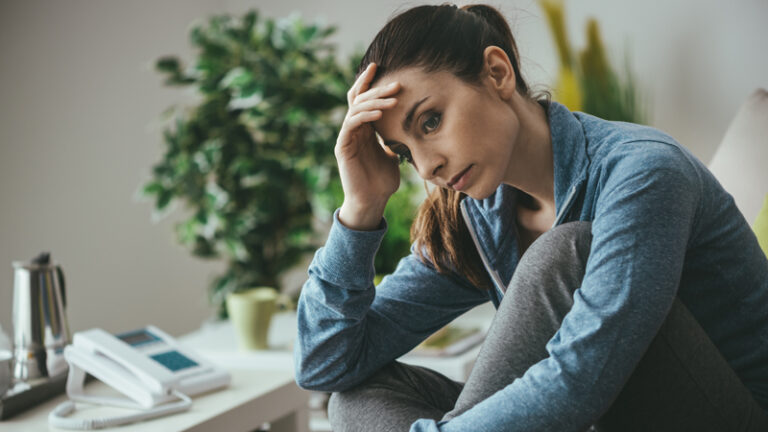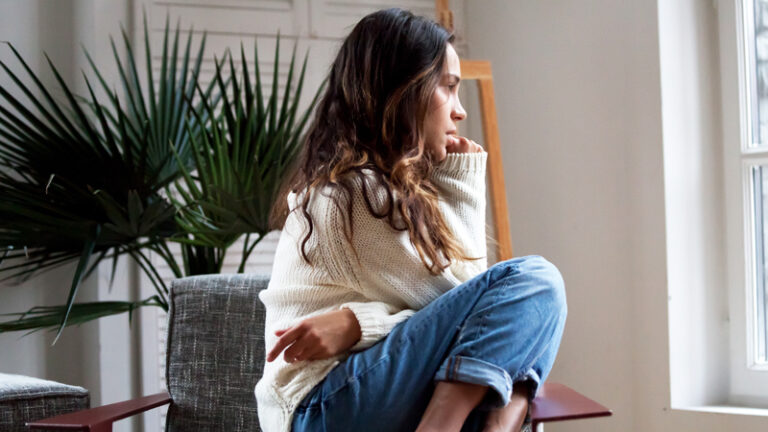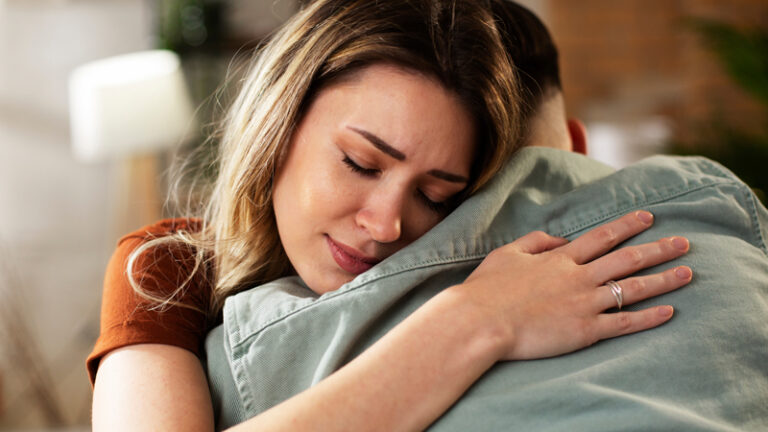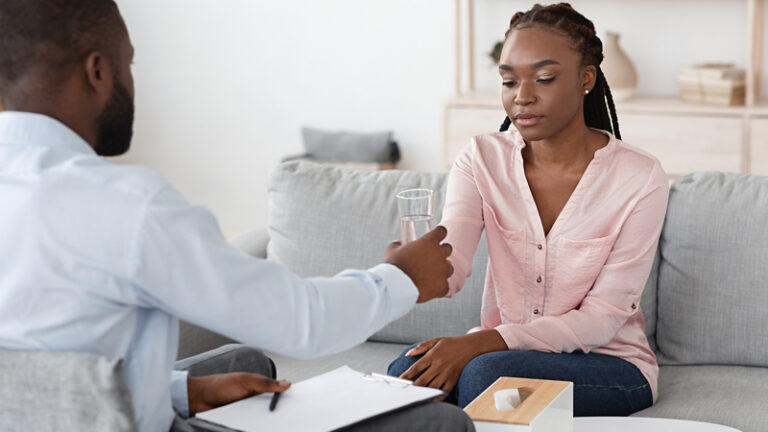Anxiety in Women …
Symptoms, Causes and Treatment
All of us experience feeling anxious and worried once in a while and in certain situations, such as when speaking in front of a crowd or leading up to a job interview. However, if you find yourself worrying all the time about most things and can’t stop doing it or coping with the physical effects of your anxiety, you may be suffering from an anxiety disorder.
While anyone can be affected by anxiety, women tend to experience it more frequently than men. Based on statistics:
- Women have a higher tendency to struggle with agoraphobia, phobias, generalised anxiety disorder (GAD), panic disorder and post-traumatic stress disorder (PTSD)
- Women are more prone to experience both anxiety and depression at the same time than men
- Women are more likely than men to suffer from more than one anxiety disorder at the same time
- In England, anxiety disorders are more prevalent amongst young women (aged 16-24) than in any other age and gender category
- Globally, it is estimated that 7% of women experience an anxiety disorder, compared to 2.8% of men

What are the Symptoms of Anxiety in Women
There are common anxiety symptoms that can impact anyone, regardless of gender. These include:
Psychological
- Constantly worrying excessively about many different things
- Feeling fearful, paranoid and tense
- Being impatient, irritable, and having angry outbursts
- Low self-esteem
- Mood swings
- Extreme stress
- Experiencing panic attacks
- Undergoing changes in appetite and sleep patterns
- Withdrawing from social interactions
- An increased consumption of alcohol or drugs
Physical
- Headaches
- Nausea
- Abdominal discomfort
- Increased heart rate or palpitations
- Shortness of breath
- Chest pains
You might feel overwhelmed by the idea of getting a diagnosis for your anxiety. However, this is the initial step you need to take for your recovery.
Why is Anxiety More Common in Women?
The higher prevalence of anxiety among women compared to men may be attributed to several factors. Women undergo life stages and experiences that are gender-specific, which can trigger or exacerbate anxiety, such as fluctuating hormones, stress, body image issues and pressures of present-day society and lifestyle. Additionally, women are more likely than men to seek help and treatment for anxiety; thus, more women with anxiety are diagnosed than men suffering from the same condition.

What Causes Anxiety in Women?
Regardless of your gender, there are several potential causes and factors that can substantially increase your chances of developing anxiety at some point in your life. These include the following:
- Being neglected or abused, especially if this happened during childhood
- Having a family history of anxiety or having a close family member who struggles with anxiety or a family history of anxiety
- Having a personal history of anxiety or other mental health problems
- Suffering from a serious physical health condition such as cancer
- Going through stressful or traumatic events such as the death of a loved one, job loss, or divorce
However, some of the specific causes of anxiety are gender-specific and are only experienced by women.
Hormones
Throughout their lives, women experience fluctuating hormone levels associated with the distinct stages their bodies go through, which are puberty, menstrual periods, pregnancy, childbirth and menopause. It’s believed that the hormonal fluctuations accompanying these life stages can contribute to the anxiety women develop anxiety during these specific periods in their lives.Puberty
Women undergo a lot of changes during puberty. Aside from the major bodily changes, which can lead to body image issues, they’re also likely to go through other changes at this stage of their lives, such as peer pressure, issues related to social media use, and worries about school. All these, alongside the hormonal changes during puberty, can bring about anxiety.
Menstrual periods cause women to experience hormonal fluctuations throughout the month, regardless of their cycle stage. Some women experience premenstrual syndrome (PMS), which negatively affects their moods, causing irritability and tiredness. Although PMS is fairly common, some women can have more severe symptoms, which may indicate a disorder called premenstrual dysphoric disorder (PMDD). Women with PMDD experience severe mood problems with symptoms very similar to depression and anxiety.
Pregnancy and childbirth
A woman’s body undergoes hormonal changes during the few weeks before and after childbirth, or the “perinatal period”.
Prenatal anxiety occurs during pregnancy and is often triggered by the common concerns of a pregnant woman, such as the stress of birthing and the pressure of preparing for the baby’s arrival. Experiencing a difficult pregnancy or struggling with debilitating morning sickness (known as hyperemesis gravidarum or “HG”) can exacerbate prenatal anxiety.
Postpartum anxiety develops within the first year of giving birth. Similar to prenatal anxiety, most of the worries are pregnancy-related, such as how to recover one’s pre-pregnancy form and the health of the baby. Women who have given birth to multiples (twins, triplets or more) are more susceptible to postpartum anxiety. It can also be experienced alongside postpartum depression.
Menopause
Menopause is another stage in a woman’s life where significant hormonal changes take place; thus, many women also develop anxiety and other mental problems during this period. A woman experiencing many physical symptoms of menopause, such as insomnia and hot flashes, is highly prone to developing anxiety at this time.
Stress
Women naturally produce more stress hormones than men, making them more likely to experience anxiety during stressful situations such as going through a divorce or suffering a bereavement.
Demands of modern life
Women in today’s society are under a lot of pressure and are expected to balance the various demands of work and family. These multiple demands can cause anxiety, stress and a host of other mental health issues, including depression in women.

How to Help a Women with Anxiety
There are many things you can do to help a women suffering from anxiety move towards recovery. Here is a list of do’s and don’ts:
Learn as much as you can about anxiety
Educate yourself as much about the topic as possible; with a better understanding of their situation, you can offer genuine support.
Open the conversation
Try to engage in a conversation with your loved one about his anxiety, encouraging her to talk openly and truthfully about how he’s feeling. Keep in mind the following:
- Be attentive to listen to her thoughts
- Support and invite her to share his emotions with you
- Don’t criticise, judge, or make assumptions
- Assure her that anxiety is a medical condition, not a sign of weakness
Talking to someone about their problems with anxiety is a challenging task, so make sure the conversation is focused on your concerns and not about her to keep her from becoming defensive. For example, you can say things like, “I’m concerned about your behaviour” or “I’d like to know if there’s anything I can do to help.”
Keep track of any signs and symptoms
In addition to those mentioned above, you can also encourage and assist your loved one to monitor his symptoms, including what they are, when they occur, and triggers, if any.
Being aware of these patterns and helping your loved ones be able to identify them as well, you can better support her in dealing with his challenging emotions and learn to know when she is experiencing an especially tough time.
Encourage her
Motivate her to seek help for his anxiety. You could offer to contact her GP and set an appointment on her behalf, then accompany her to provide moral support. You may also want to research treatment options that can help your loved one. Ultimately, reassure her that seeking help is nothing to be ashamed of and that you’re willing to be there for her if she wants you to be.
Every day, encourage her to continue doing things that make her happy and eat well. Be with her when she attends social events and make sure she pursues her hobbies. These little things may not seem like a lot, but they are great mood boosters that work wonderfully in the day-to-day management of anxiety.

What lies behind us and what lies before us are
tiny matters compared to what lies within us
Treatment for Women with Anxiety
There are several treatment options for women suffering with an anxiety disorder. The best course of treatment will be decided by both the patient and the medical professional helping them.
Common anxiety treatments include:
- Outpatient treatment for anxiety
Inpatient treatment involves staying in a dedicated facility on a residential basis where you can receive 24/7 treatment and support from a highly qualified and experienced team of mental health professionals. This is the ideal treatment setup if you are suffering from severe anxiety symptoms and need a breather from your normal everyday life to recovery.
- Day care
With day care, your anxiety therapy entails going to any of our treatment clinics each week for a certain number of full or half days. This treatment format is designed for women who don’t need intensive 24-hour support but require continuous and structured care for their anxiety.
- Inpatient (residential) treatment
Inpatient treatment for anxiety involves staying at one of our treatment centres on a residential basis, where you will be provided with intensive treatment and 24-hour support. Inpatient treatment gives you a chance to take a break from your everyday life and whatever negative influences are making your anxiety worse – reasons why this treatment format is effective in treating anxiety.
Online therapy for anxiety
We also offer online therapy to provide flexibility and meet the needs of our patients. This therapy format allows you access to support for anxiety from the comfort of your home and at a time that’s convenient for you.

Therapy for Anxiety
We provide different therapy types and formats to treat anxiety:-
Cognitive behavioural therapy (CBT)
One of the most common therapies is cognitive behavioural therapy (CBT), which is premised on the idea that anxiety is caused and exacerbated by negative thought patterns. These patterns can be deeply ingrained and cause you to respond to and process situations in unhealthy ways. Thus, CBT aims to address the unhealthy thought processes that form the foundation of your anxiety and explore the fundamental reasons why they developed, ultimately helping you develop a more positive perspective on situations.
CBT has been proven to provide lasting benefits and equips you with effective coping strategies for the future that will enable you to recognise negative thoughts when they enter your mind and respond to them positively and not with anxiety.
Exposure therapy
This is another form of treatment method we use for tackling anxiety. It aims to reduce your distress by exposing you to objects, situations, or events that cause them. This process of exposure is done in carefully graded steps, helping you confront your fears and eventually overcome your anxiety.
Eye movement desensitisation and reprocessing (EMDR)
This involves letting your brain resume its natural healing process and is used in the treatment of brain or traumas, PTSD and panic disorders.
Aside from the above techniques, we also offer a range of talking therapies designed to address anxiety, and these are available in the following formats:
One-to-one therapy
This type of therapy is done on an individual basis between yourself and an anxiety specialist. During your sessions, the therapist will be able to address your unique concerns, helping you achieve the best results as an individual. This therapy can be done face-to-face or as part of therapy conducted online.
Group therapy
This is a support group type of therapy. Men who have been diagnosed with anxiety or suffering through similar issues make up the group, and the aim is to share your experiences, offer mutual support and guidance, and talk with compassionate men about your anxiety in a safe space without the fear of being judged. Together, these groups provide a rich source of strength and hope to those attending the sessions.
Family and couples therapy
This is another kind of group therapy but one that involves your family or loved ones. It aims to help you have an open and honest conversation with these people about your anxiety, enabling them to have an understanding of anxiety, recognise the signs and symptoms, and examine the impact that anxiety is having on you and them.
Anxiety Medication
When used to complement therapy, medication may also be especially beneficial. This can be prescribed to assist you with your anxiety, which you can take alongside CBT and other types of therapy. Medication, if appropriate can be prescribed by a highly trained psychiatrist to complement the therapy treatments. The different types of anxiety medication are as follows:
- Selective serotonin reuptake inhibitors (SSRIs)
Referred to as SSRIs, this is the most recommended class of anxiety medication which works as an antidepressant. It is vital to take a full course of SSRI treatment, which typically lasts for nine months or more - Beta-blockers
Beta-blockers, such as Propranolol, can help to minimise the physical symptoms of anxiety. These medications can be helpful in specific situations, such as when you have to perform or speak in public, if these things trigger your anxiety.
When Should I Get Anxiety Treatment?
If you are no longer able to function on a daily basis due to your worries and anxiety, it’s time to seek professional help.
You need not suffer alone because the condition is treatable, and complete recovery is achievable. We successfully assist thousands of women every year in overcoming their anxiety and allowing them to return to their healthy and fulfilling lives. We have a world-class team of psychiatrists, psychologists, and therapists committed to helping you through your journey to getting your life back on track.
FREE Anxiety Assessment
If you or a loved one are struggling with anxiety, there is hope and a solution for you. You can receive treatment as an outpatient or inpatient and through one-on-one or support group therapy. We understand the challenges you’re facing and we’re here to offer compassionate help and support.
Our multidisciplinary team of experts have successfully treated thousands of people suffering from anxiety, helping them regain control of their lives.
We can present and explain the world-class treatment options we offer, discuss your problem with anxiety with you, assess your condition, and give you recommendations on the best and most appropriate next step you can take so you can regain control of your life.
Our highly trained advisers are available to speak to you right away, simply call 0808 252 3379 today.
We can discuss your concerns in complete confidence, explore the options for treatment, and help you to understand what will work best for you.
We’ll also help you to book your free anxiety assessment there and then, with appointments usually available within only a few days.
We understand that taking the first step can be the most difficult, but we’re here to offer support – with no pressure or judgement.
Professional and compassionate help is just a phone call or click away.




